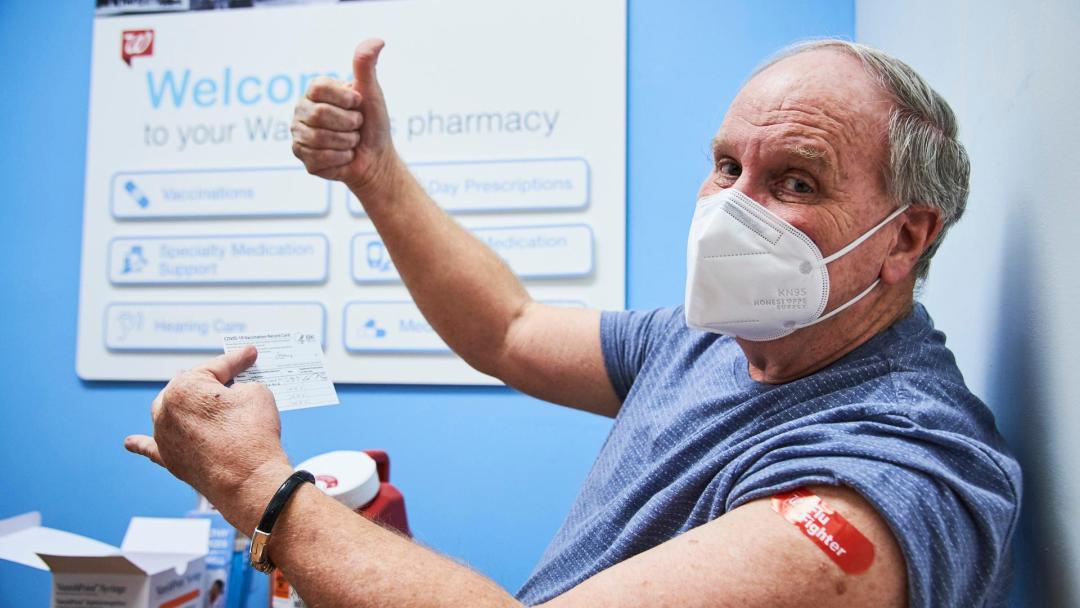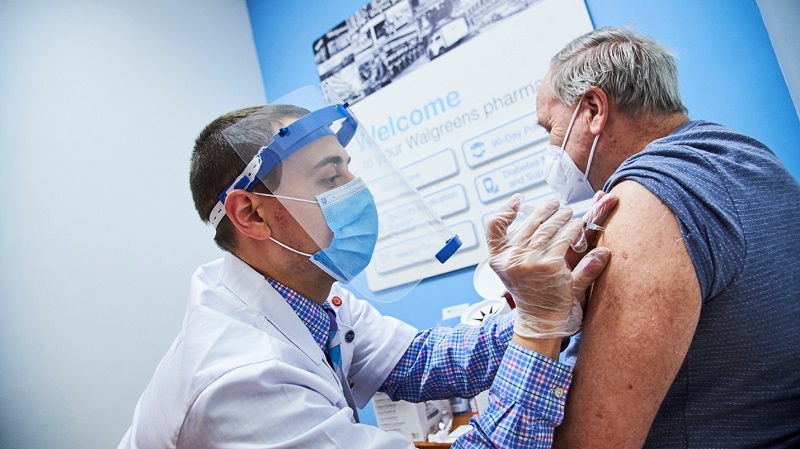… primarily due to higher prescription volumes, including mail and central specialty following the formation of AllianceRx Walgreens … a presence in more than 25* countries and employ more than 385,000* people. The company is a global leader in pharmacy-led, health and …
Pharmacy & Healthcare
The safest vaccine? The one you can get.
Walgreens Chief Medical Officer Dr. Kevin Ban answers questions on how the COVID-19 vaccines compare.
Sarah Cason, Walgreens Stories

Following the FDA’s emergency use authorization of Johnson & Johnson’s vaccine, it joins Pfizer and Moderna to make a total of three available in the fight against COVID-19. While it’s up to federal, state and local jurisdictions to choose and order supply, you might be wondering: Which vaccine is the best for me? Walgreens Stories sat down with Dr. Kevin Ban, Walgreens chief medical officer, to determine the value of each vaccine.
 What vaccines are available at Walgreens now and will be in the future?
What vaccines are available at Walgreens now and will be in the future?
Dr. Kevin Ban: Right now, Walgreens has been receiving weekly allotments of the Pfizer and Moderna vaccines. Now that the Johnson & Johnson vaccine received emergency use authorization by the FDA, doses have already begun to ship. All authorized vaccines have been deemed safe and effective by the FDA, and as part of the Federal Retail Pharmacy Program, CDC provided Walgreens with allocations by jurisdiction to ensure equitable distribution across the country. We expect to receive the J&J vaccine and begin administering it in the coming days.
They were all approved for emergency use by the FDA in record time. Are they trustworthy?
Ban: The development of each vaccine was a very efficient process. Scientists around the world collaborated to understand the sequence of the virus and create a vaccine. The regulatory bodies worked very closely with manufacturers so that when data became available, it was being reviewed. All of the touchpoints for safety and effectiveness were met.
If efficacy varies across each vaccine, which one should I get?
Ban: Vaccines should not be compared solely on their efficacy, as they were studied at different times during the pandemic in different regions that could impact how effective the vaccine appears to be. Regardless of the specific product you receive, the best vaccine for you is the vaccine you get. All vaccines demonstrate effectiveness in reducing deaths and severe disease, and all have benefits and risks.
Some of the benefits of Johnson & Johnson’s COVID-19 vaccine include easy transport with a single dose, which allows for expanded availability in most community settings and mobile sites, as supply scales up. Having different types of vaccines available for use – especially ones with different dosing recommendations and storage and handling requirements – can offer more options and flexibility for the public. Since beginning administration of COVID-19 vaccines in December, millions of Americans have received COVID-19 vaccines under the most intense safety monitoring in U.S. history, with very few reports of adverse events – defined as any serious health problem that happens after a shot.
Vaccine will help to reduce spread, hospitalizations and deaths in your community, and get us closer to herd immunity. Again, we encourage you to make an appointment for a vaccination when you’re eligible in your area to help us recover from the pandemic.
How were the vaccine trials run?
Ban: Clinical trials for authorized vaccines took into consideration diverse populations to ensure efficacy in adults. For example, clinical trials found consistent high efficacy for both the Pfizer and Moderna vaccines across age, sex, race and ethnicity categories, and among persons with underlying medical conditions. This implies that no matter your background, this vaccine can safely and effectively help to protect you from COVID-19.
The Johnson & Johnson vaccine was tested in different countries and among different populations across the U.S., Latin America and South Africa. In the largest clinical trial of the three vaccines, Johnson & Johnson had more than 40,000 participants, and no hospitalizations or deaths due to COVID-19 were reported. It’s important to note that the vaccine was effective against variants that have arisen in South Africa and Brazil. It was less effective at preventing symptomatic COVID-19 in South Africa, but still highly effective at preventing severe illness. Preliminary data shows that the vaccine likely helps prevent asymptomatic infection, and the Brazil variant does not have as much impact on efficacy as the South African variant.
Pfizer and Moderna have also begun testing their vaccines against new variants. For example, Pfizer is now testing how adding a third dose of vaccine might increase protection against variants, and is also in discussions about testing a modified vaccine. Moderna reported producing an updated version of its COVID-19 vaccine to help protect against the variant first seen in South Africa and is undergoing a clinical study.

Is there a difference in side effects?
Ban: Every person is different and may experience different side effects. This is normal. It’s a sign your body is building protection against COVID-19. Moderna and Pfizer share common side effects like chills, headache, tiredness, and soreness and swelling at the injection site. Common side effects for the Johnson & Johnson vaccine have similar effects for the most part, and per study data have lower rates of side effects and severe allergic reactions than the Pfizer and Moderna vaccines.
Typically side effects can be cared for at home with over-the-counter medicine like fever reducers, or ice packs and good old fashion rest, resolving within a day or two.
Again, the FDA has deemed each vaccine safe, so side effects are something that can only be evaluated on an individual level. At this point, the CDC advises patients to get vaccinated with any of the authorized vaccines available to them.
Why do I only need one shot of the Johnson & Johnson vaccine vs. two for the Pfizer or Moderna vaccines?
Ban: They function differently. Different dosing intervals were evaluated to determine the best protection provided by authorized vaccines. When the Pfizer and Moderna vaccines were first tested, a weaker immune response was found following dose one and a stronger response was found weeks after dose two, resulting in highly effective vaccines to help prevent COVID-19 infections with relatively minimal side effects. Pfizer and Moderna vaccines were only tested with a two-dose vaccine, so we don’t know exactly how long protection from one dose would last, though it is being studied.
Johnson & Johnson was tested and authorized as a one-dose vaccine, but is also being evaluated as a two-dose series for increased and prolonged protection.
How do the technologies behind these authorized vaccines differ?
Ban: The Johnson & Johnson vaccine is a single-dose carrier, or virus vector, vaccine. This means it uses a different, harmless virus to deliver instructions to human cells, making the SARS-2 spike protein and triggering an immune response to fend off the virus.
Pfizer and Moderna, on the other hand, are two-dose vaccines using mRNA technology that makes a surface protein on the SARS-2 virus. The proteins made with the mRNA instructions activate the immune system, teaching it to see the spike protein as foreign and develop antibodies and other immunity weapons to fight it. This vaccine requires two doses to ensure the most protection, with 21 days between the first and second dose for the Pfizer vaccine and 28 days between the first and second dose for the Moderna vaccine.
Is there any possibility I can still get COVID-19 if I take the vaccine, especially with new strains emerging?
Ban: You can think of COVID-19 vaccines similarly to how you think about an annual flu shot. Yes, there is a chance you can get COVID-19 even once vaccinated, however, the protection you gain approximately two weeks after getting the recommended vaccine doses will serve to lessen the severity of the infection and help prevent you from getting severely ill, being hospitalized or losing your life. The more we’re able to keep people from getting really sick, the more we can reduce the burden on our healthcare system and get closer to returning to normalcy.
Given these variants seem to spread more easily and quickly than other variants, we have to remain vigilant with safety precautions including wearing face masks, social distancing, frequent handwashing and staying home when you’re sick.
What do we know about the longevity of the protection each vaccine offers?
Ban: We don’t have the data yet to make long-term predictions. But every person who is immunized is a step toward herd immunity. We advise patients to get vaccinated with the vaccine available to them, as the FDA has carefully evaluated all vaccines commercially available and deemed them to be safe and effective at preventing COVID-19. Getting vaccinated against COVID-19 helps to reduce hospitalizations, prevent deaths and brings us closer to ending the pandemic.
 What vaccines are available at Walgreens now and will be in the future?
What vaccines are available at Walgreens now and will be in the future?Dr. Kevin Ban: Right now, Walgreens has been receiving weekly allotments of the Pfizer and Moderna vaccines. Now that the Johnson & Johnson vaccine received emergency use authorization by the FDA, doses have already begun to ship. All authorized vaccines have been deemed safe and effective by the FDA, and as part of the Federal Retail Pharmacy Program, CDC provided Walgreens with allocations by jurisdiction to ensure equitable distribution across the country. We expect to receive the J&J vaccine and begin administering it in the coming days.
They were all approved for emergency use by the FDA in record time. Are they trustworthy?
Ban: The development of each vaccine was a very efficient process. Scientists around the world collaborated to understand the sequence of the virus and create a vaccine. The regulatory bodies worked very closely with manufacturers so that when data became available, it was being reviewed. All of the touchpoints for safety and effectiveness were met.
If efficacy varies across each vaccine, which one should I get?
Ban: Vaccines should not be compared solely on their efficacy, as they were studied at different times during the pandemic in different regions that could impact how effective the vaccine appears to be. Regardless of the specific product you receive, the best vaccine for you is the vaccine you get. All vaccines demonstrate effectiveness in reducing deaths and severe disease, and all have benefits and risks.
Some of the benefits of Johnson & Johnson’s COVID-19 vaccine include easy transport with a single dose, which allows for expanded availability in most community settings and mobile sites, as supply scales up. Having different types of vaccines available for use – especially ones with different dosing recommendations and storage and handling requirements – can offer more options and flexibility for the public. Since beginning administration of COVID-19 vaccines in December, millions of Americans have received COVID-19 vaccines under the most intense safety monitoring in U.S. history, with very few reports of adverse events – defined as any serious health problem that happens after a shot.
Vaccine will help to reduce spread, hospitalizations and deaths in your community, and get us closer to herd immunity. Again, we encourage you to make an appointment for a vaccination when you’re eligible in your area to help us recover from the pandemic.
How were the vaccine trials run?
Ban: Clinical trials for authorized vaccines took into consideration diverse populations to ensure efficacy in adults. For example, clinical trials found consistent high efficacy for both the Pfizer and Moderna vaccines across age, sex, race and ethnicity categories, and among persons with underlying medical conditions. This implies that no matter your background, this vaccine can safely and effectively help to protect you from COVID-19.
The Johnson & Johnson vaccine was tested in different countries and among different populations across the U.S., Latin America and South Africa. In the largest clinical trial of the three vaccines, Johnson & Johnson had more than 40,000 participants, and no hospitalizations or deaths due to COVID-19 were reported. It’s important to note that the vaccine was effective against variants that have arisen in South Africa and Brazil. It was less effective at preventing symptomatic COVID-19 in South Africa, but still highly effective at preventing severe illness. Preliminary data shows that the vaccine likely helps prevent asymptomatic infection, and the Brazil variant does not have as much impact on efficacy as the South African variant.
Pfizer and Moderna have also begun testing their vaccines against new variants. For example, Pfizer is now testing how adding a third dose of vaccine might increase protection against variants, and is also in discussions about testing a modified vaccine. Moderna reported producing an updated version of its COVID-19 vaccine to help protect against the variant first seen in South Africa and is undergoing a clinical study.

Is there a difference in side effects?
Ban: Every person is different and may experience different side effects. This is normal. It’s a sign your body is building protection against COVID-19. Moderna and Pfizer share common side effects like chills, headache, tiredness, and soreness and swelling at the injection site. Common side effects for the Johnson & Johnson vaccine have similar effects for the most part, and per study data have lower rates of side effects and severe allergic reactions than the Pfizer and Moderna vaccines.
Typically side effects can be cared for at home with over-the-counter medicine like fever reducers, or ice packs and good old fashion rest, resolving within a day or two.
Again, the FDA has deemed each vaccine safe, so side effects are something that can only be evaluated on an individual level. At this point, the CDC advises patients to get vaccinated with any of the authorized vaccines available to them.
Why do I only need one shot of the Johnson & Johnson vaccine vs. two for the Pfizer or Moderna vaccines?
Ban: They function differently. Different dosing intervals were evaluated to determine the best protection provided by authorized vaccines. When the Pfizer and Moderna vaccines were first tested, a weaker immune response was found following dose one and a stronger response was found weeks after dose two, resulting in highly effective vaccines to help prevent COVID-19 infections with relatively minimal side effects. Pfizer and Moderna vaccines were only tested with a two-dose vaccine, so we don’t know exactly how long protection from one dose would last, though it is being studied.
Johnson & Johnson was tested and authorized as a one-dose vaccine, but is also being evaluated as a two-dose series for increased and prolonged protection.
How do the technologies behind these authorized vaccines differ?
Ban: The Johnson & Johnson vaccine is a single-dose carrier, or virus vector, vaccine. This means it uses a different, harmless virus to deliver instructions to human cells, making the SARS-2 spike protein and triggering an immune response to fend off the virus.
Pfizer and Moderna, on the other hand, are two-dose vaccines using mRNA technology that makes a surface protein on the SARS-2 virus. The proteins made with the mRNA instructions activate the immune system, teaching it to see the spike protein as foreign and develop antibodies and other immunity weapons to fight it. This vaccine requires two doses to ensure the most protection, with 21 days between the first and second dose for the Pfizer vaccine and 28 days between the first and second dose for the Moderna vaccine.
Is there any possibility I can still get COVID-19 if I take the vaccine, especially with new strains emerging?
Ban: You can think of COVID-19 vaccines similarly to how you think about an annual flu shot. Yes, there is a chance you can get COVID-19 even once vaccinated, however, the protection you gain approximately two weeks after getting the recommended vaccine doses will serve to lessen the severity of the infection and help prevent you from getting severely ill, being hospitalized or losing your life. The more we’re able to keep people from getting really sick, the more we can reduce the burden on our healthcare system and get closer to returning to normalcy.
Given these variants seem to spread more easily and quickly than other variants, we have to remain vigilant with safety precautions including wearing face masks, social distancing, frequent handwashing and staying home when you’re sick.
What do we know about the longevity of the protection each vaccine offers?
Ban: We don’t have the data yet to make long-term predictions. But every person who is immunized is a step toward herd immunity. We advise patients to get vaccinated with the vaccine available to them, as the FDA has carefully evaluated all vaccines commercially available and deemed them to be safe and effective at preventing COVID-19. Getting vaccinated against COVID-19 helps to reduce hospitalizations, prevent deaths and brings us closer to ending the pandemic.